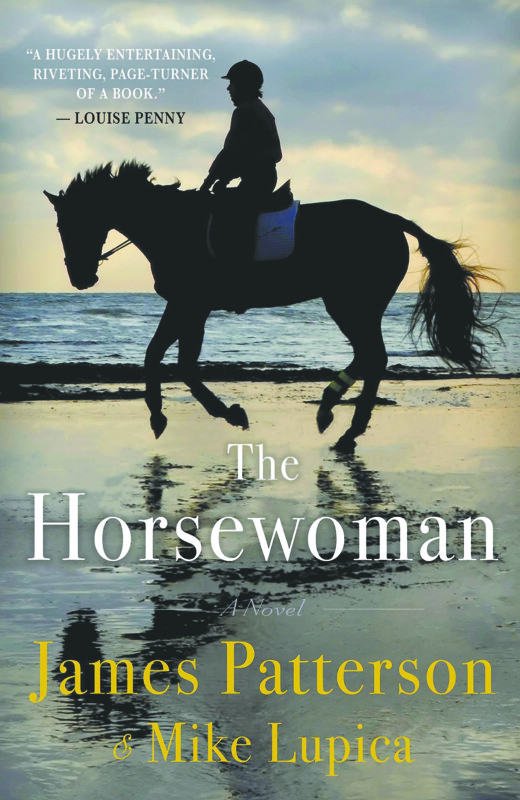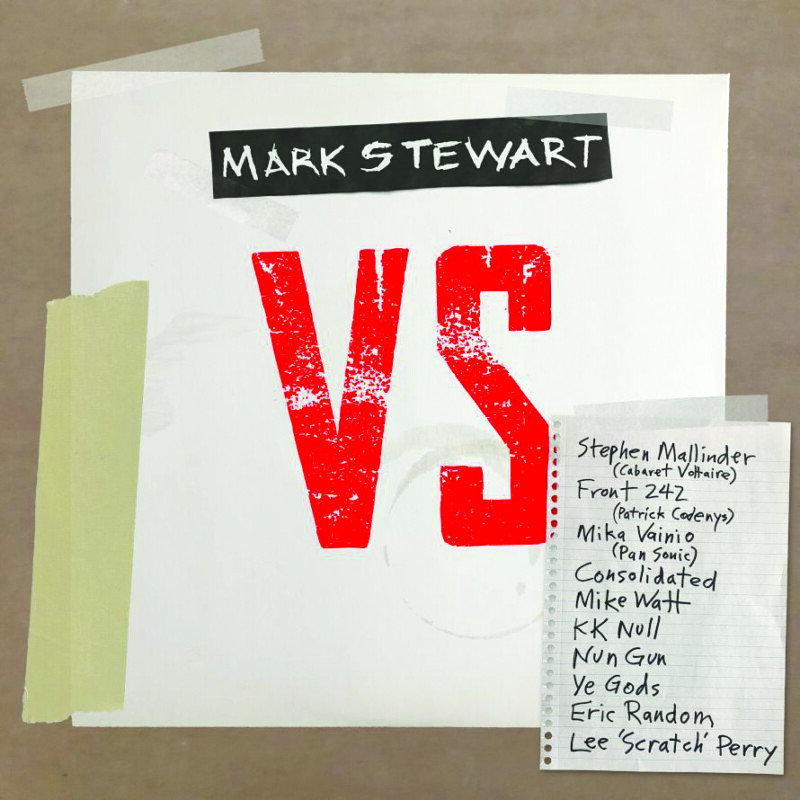The Horsewoman, by James Patterson and Mike Lupica (Little, Brown & Co., 433 pages)
I probably shouldn’t confess this in public, but until this week, I was a James Patterson virgin.
Called by his publisher “the best-selling author in the world,” a claim questioned by Google, Patterson certainly is among the richest and most prolific. How many books has he written or co-written? There’s a printable checklist on his website that goes on for longer than I cared to count; in 2017, the Wall Street Journal put the number at 150. And lately, of course, Patterson has taken to collaborating with celebrities — for example, The President is Missing, written with former President Bill Clinton, and the upcoming Run, Rose, Run with Dolly Parton.
With a catalog like that, Patterson seems to offer something for everyone, and I thought he’d finally delivered for me with The Horsewoman; its jacket blurb promises “breakneck speed and hair-raising thrills and spills.” That should have been a warning, as should have been the partnership with sportswriter Mike Lupica, who comes by his knowledge of the horse world as the father of a competitive rider. In other words, Patterson knows the formula, and Lupica filled in the details.
The result: a formulaic yawner that’s twice as long as it needed to be, and it’s debatable whether it needed to be at all. (Does Patterson really need more money or adulation at this point?) But because Patterson is a pro at turning out bestselling novels, The Horsewoman has a serviceable elevator pitch:
A mother, Maggie Atwood, was on track to make the U.S. equestrian team in the Olympics but months before the qualifying trials, she was injured in a fall from her horse, putting not only her dreams at risk but also the solvency of the family farm. Her daughter, Becky, a hithertofore lackluster rider, reluctantly steps up to take her mother’s place. Then, because, as Becky repeatedly says, “[excrement] happens,” it turns out that the mother recovers and is able to compete after all and wants her horse back, setting up the pair to have many first-world resentments and to compete against each other in the Paris Olympics.
There’s more to the story, of course. There is a villain in the form of an investor in Maggie’s horse, who wants to take full control of the horse, instead of the 60 percent share he owns. Steve Gorton is a caricature of a villain, complete with the hedge fund and the Ferrari and the Harvard Business School ballcap.
Then there’s Daniel, the trainer from Mexico who is a love interest for Becky and also justifies some political theater involving the treatment of “Dreamers” — undocumented workers whose parents brought them to the U.S. as children. There’s also the reliable tension of assorted family drama — the cold and critical matriarch who snaps at her granddaughter a lot, and the absent father who only shows up halfway through the book.
It keeps you turning the pages because formulas work even when they are obvious: The short chapters, some only a couple of pages in length, that always end with some small cliffhanger, even it’s resolved on the very next page; the occasional good line thrown in to make you think “this isn’t so bad” even though it kind of is, at least compared to, say, Dickens.
Although the focus changes throughout the book — from Becky to Daniel to Maggie — it never deviates from the intellectual level of the 21-year-old Becky (who says things like “This guy doesn’t know a bridle from a bridesmaid”), even when it’s expounding on the minutiae of equine infections.
The Horsewoman kept reminding me of another, more interesting story about a horse family struggling against the odds, the story told in the 2010 Disney film Secretariat. Though the film was embellished, it was a largely true story about a woman fighting to save her family farm with a risky but promising horse. Secretariat had the same problem that Patterson and Lupica faced: how to make sympathetic characters out of poor little rich girls whose chief worries in life are losing multimillion-dollar farms and horses. But Disney gave its cinematic story a heart; Patterson and Lupica never do.
While they talk about the Atwood family’s struggles to keep their farm and to hold onto a horse worth more than a million dollars, Becky casually mentions her CWD saddle (the brand starts at around $5,000), and of course there’s the travel to all the horse shows, and the veterinary bills, and all the other things that make competitive riding a rich person’s sport. As such, this is a novel that will also have appeal on a certain socioeconomic level. It also helps if you’re a horse-obsessed 15-year-old girl.
The most offensive thing this novel does, however, is not the dumbing down of an intriguing premise, but that it, like a grasping New York socialite, drops names.
During a competition, the names of two real equestrians show up — Jennifer Gates, the daughter of Bill Gates, and Georgina Bloomberg, Michael Bloomberg’s daughter. I’m sure they’re lovely people and have every right to appear in a novel with hair-raising thrills and spills, but their inclusion among otherwise fictional characters seemed a shameless bid for attention from people who can afford to buy lots of books.
If this is what it takes to be the best-selling author in the world, count me out as a fan. C-
Book Notes
Ten years ago, Amy Diaz offered me the opportunity to review books for the Hippo. This was a leap of faith on her part.
Even though I had been a journalist longer than most of you have been alive, at the time, I had exactly one book review to my credit: a blistering takedown of Caitlin Flanagan’s first book, To Hell With All That, that hasn’t aged well. Flanagan has since become one of The Atlantic’s best known and most beloved writers. I stand by the review, nonetheless.
Here, we give books a letter grade, but there’s another grading system that has evolved at my house: Terrible or mediocre books are given away, good books are “lent” to friends (never to be seen again), and the very best books never leave the house. This system is a pure and cold calculus of a book’s worth, given that I have limited space and seem to downsize every few years. So, on the occasion of my decade with the Hippo, here, in no particular order, are some of the books I once reviewed and now refuse to part with:
The Dog Stars (Knopf, 336 pages) — 2012 novel by Peter Heller about a man and his dog in a post-apocalyptic world.
The End of Night (Little, Brown & Co., 336 pages) — 2013 nonfiction by Paul Bogard about what artificial light is doing to the planet and our brains.
The Regrets (Little, Brown & Co., 304 pages) — 2020 novel by Amy Bonnaffons about a man caught between Earth and the afterlife.
Dwelling in Possibility (Bauhan Publishing, 240 pages) — 2013 nonfiction by New Hampshire author Howard Mansfield, who muses on “searching for the soul of shelter.”
The Mindful Carnivore (Pegasus, 304 pages) — 2013 nonfiction by conflicted carnivore Tovar Cerulli, who went from vegan to hunter.
This is How (St. Martin’s, 240 pages) — thought-provoking essays by Augusten Burroughs, the Running With Scissors guy, on how to overcome a lifetime of problems and catastrophes.
Florida Man (Random House, 416 pages) — 2020 novel by Tom Cooper, wickedly funny and fresh.
Bowlaway (Deckle Edge, 384 pages) — 2019 novel by Elizabeth McCracken that had me at the first sentence: “They found a body in Salford Cemetery, but above ground and alive.”
How to Have a Good Day (Currency, 368 pages) — 2016 nonfiction by Caroline Webb that is a well-written encyclopedia of social-science research on improving pretty much everything in your life.
A Particular Kind of Black Man (Simon & Schuster, 272 pages) — fiction by Nigerian-American writer Tope Folarin, whose real-life experiences inform this account of an outsider trying to find his path in America.
There are more, but the others might yet be given away. All of the above are keepers.
Book Events
Author events
• MARGARET ATWOOD Author presents Burning Questions: Essays and Occasional Pieces, 2004 to 2021, in conversation with Judy Blume. Ticketed virtual event hosted by Gibson’s Bookstore in Concord. Tues., March 1, 8 p.m. Tickets cost $30. Via Zoom. Visit gibsonsbookstore.com or call 224-0562.
• HOWARD MANSFIELD Author presents Chasing Eden. Sat., March 19, 9:45 to 11:45 a.m. Peterborough Town Library, 2 Concord St., Peterborough. Visit monadnockwriters.org.
• BECKY SAKELLERIOU AND HENRY WALTERS Becky Sakelleriou presents The Possibility of Red. Henry Walters presents Field Guide A Tempo. Sat., April 16, 9:45 to 11:45 a.m. Peterborough Town Library, 2 Concord St., Peterborough. Visit monadnockwriters.org.
Poetry
• REBECCA KAISER Poet presents Girl as Birch. Virtual event hosted by Gibson’s Bookstore in Concord. Mon., April 11, 7 p.m. Via Zoom. Registration required. Visit gibsonsbookstore.com or call 224-0562.
Book Clubs
• BOOKERY Online. Monthly. Third Thursday, 6 p.m. Bookstore based in Manchester. Visit bookerymht.com/online-book-club or call 836-6600.
• GIBSON’S BOOKSTORE Online, via Zoom. Monthly. First Monday, 5:30 p.m. Bookstore based in Concord. Visit gibsonsbookstore.com/gibsons-book-club-2020-2021 or call 224-0562.
• TO SHARE BREWING CO. 720 Union St., Manchester. Monthly. Second Thursday, 6 p.m. RSVP required. Visit tosharebrewing.com or call 836-6947.
• GOFFSTOWN PUBLIC LIBRARY 2 High St., Goffstown. Monthly. Third Wednesday, 1:30 p.m. Call 497-2102, email elizabethw@goffstownlibrary.com or visit goffstownlibrary.com
• BELKNAP MILL Online. Monthly. Last Wednesday, 6 p.m. Based in Laconia. Email bookclub@belknapmill.org.
• NASHUA PUBLIC LIBRARY Online. Monthly. Second Friday, 3 p.m. Call 589-4611, email information@nashualibrary.org or visit nashualibrary.org.





